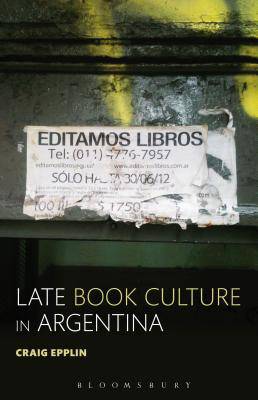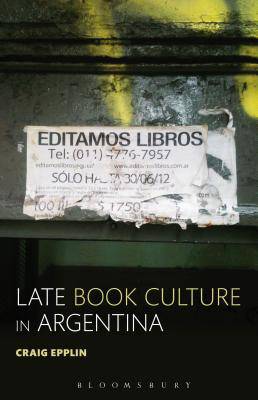
Bedankt voor het vertrouwen het afgelopen jaar! Om jou te bedanken bieden we GRATIS verzending (in België) aan op alles gedurende de hele maand januari.
- Afhalen na 1 uur in een winkel met voorraad
- In januari gratis thuislevering in België
- Ruim aanbod met 7 miljoen producten
Bedankt voor het vertrouwen het afgelopen jaar! Om jou te bedanken bieden we GRATIS verzending (in België) aan op alles gedurende de hele maand januari.
- Afhalen na 1 uur in een winkel met voorraad
- In januari gratis thuislevering in België
- Ruim aanbod met 7 miljoen producten
Zoeken
Omschrijving
Modern literary culture depended on the medium of the print book. Today, with the advent of digital technologies, it is far from apparent that print is, or should be, the vehicle of choice for contemporary writers. Print has been placed in relief, as the book becomes a site of experimentation with new platforms for writing. Among Latin American countries, none has been as crucial player in the world of print as Argentina. Argentine presses were the channel for many of the great modern literary experiments in Latin America. As such, it comes as no surprise that today, when those same presses have been gobbled up by transnational media conglomerates and digital technologies abound, Argentine writers would be attentive to the shifting media of literature. Late Book Culture in Argentina chronicles that shift. Epplin offers readings of some of the most innovative Argentine writers and collective projects of recent years: Osvaldo Lamborghini, César Aira, the cardboard publishing house Eloísa Cartonera, the poetry project Estación Pringles, Sergio Chejfec, and Pablo Katchadjian. This corpus provides a lens through which to understand the numerous experiments with literary formats in Argentina today. These experiments take on a number of forms-digital, artisanal, and collective-and they provide the ferment for some of Argentina's most audacious contemporary literature. As such they deserve critical attention and theoretical examination.
Specificaties
Betrokkenen
- Auteur(s):
- Uitgeverij:
Inhoud
- Aantal bladzijden:
- 168
- Taal:
- Engels
Eigenschappen
- Productcode (EAN):
- 9781501318276
- Verschijningsdatum:
- 25/02/2016
- Uitvoering:
- Paperback
- Formaat:
- Trade paperback (VS)
- Afmetingen:
- 152 mm x 229 mm
- Gewicht:
- 231 g

Alleen bij Standaard Boekhandel
+ 176 punten op je klantenkaart van Standaard Boekhandel
Beoordelingen
We publiceren alleen reviews die voldoen aan de voorwaarden voor reviews. Bekijk onze voorwaarden voor reviews.









